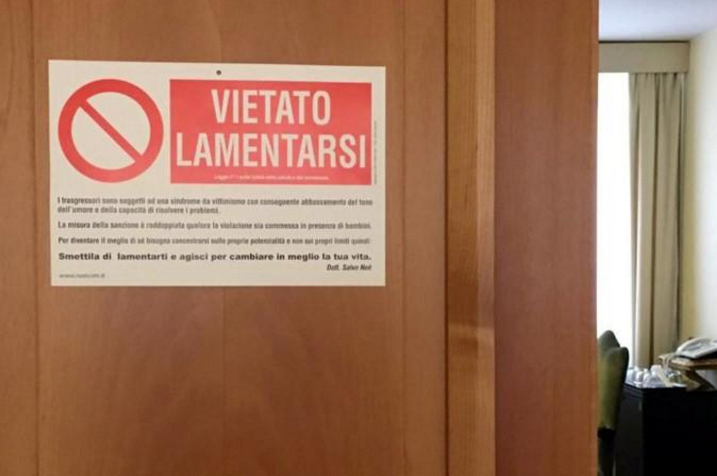'No Whining': The warning sign on the Pope's door
If anyone had any doubts how Pope Francis feels about people who always complain, the answer is now tacked to the door of his frugal suite in a Vatican residence: 'No Whining'.
Under the explicit warning, the red-and-white Italian language sign goes on to say that 'violators are subject to a syndrome of always feeling like a victim and the consequent reduction of your sense of humour and capacity to solve problems'.

A picture of the sign was posted on the Vatican Insider website and its presence on the Pope's door confirmed to Reuters by its editor-in-chief Andrea Tornielli, an author who is close to Francis and has interviewed him several times.
The sign is adorned with the international symbol for 'no' – a backslash in a circle.
It adds: 'The penalty is doubled if the violation take place in the presence of children. To get the best out of yourself, concentrate on your potential and not on your limitations.'
Then the closing zinger: 'Stop complaining and take steps to improve your life.'
The sign was given to the Pope recently by Italian psychologist and self-help author Salvo Noe. Francis promised Noe he would put it up in his office for a laugh.
Francis has had no shortage of complainers since his election in 2013. He has tried to steer the 1.2 billion-member Roman Catholic Church on a slightly more liberal path, angering conservatives who say he is sowing doctrinal confusion.
A particular focus for his opponents has been his encyclical Amoris Laetitia (The Joy of Love), which they say is vague on important points of doctrine. It allows too much freedom to interpret Church teaching in a liberal direction on communion for divorced people who have remarried, critics say.
Four cardinals – Italian Carlo Caffarra, American Raymond Burke and Germans Walter Brandmüller and Joachim Meisne – sent the Pope five questions or 'dubia' ('doubts') about the document last year but did not receive an answer. Traditionalists have called for the Pope to be 'fraternally corrected' for his views.
Another recent episode involved German Cardinal Gerhard Mueller, a German whom the Pope removed last month from his post as Vatican doctrinal chief at the end of a five-year term.
Mueller, who disagrees with Francis on a number of issues, apparently expected his mandate to be renewed automatically. He later told a German newspaper that the way he was treated was 'unacceptable'.
Additional reporting by Reuters.











